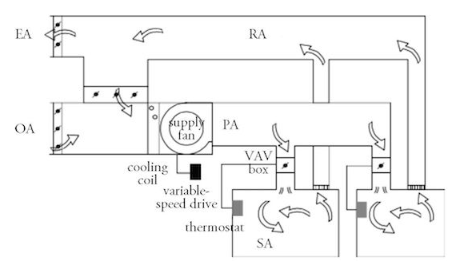Calculation of marine air conditioning systems based on energy savings
DOI:
https://doi.org/10.25043/19098642.156Keywords:
Thermal load, solar radiation, life cycle cost, marine air conditioningAbstract
The development of ship propulsion in the areas of Economic Operation, Environmental Protection and Ship Efficiency (Triple E - Economy, Environment, Efficiency) is the comparison standard of the manufacturers of contemporary ships. The standard is based on the application of a more modern design of the diesel engines, the wide use of waste heat and the efficient operation of the ship.
In accordance with the Economic Operation, the need to evaluate the design of air conditioning systems has been identified in order to determine the possible savings, which are represented by a decrease in fuel consumption, as a result of: the significant impact of this consumption in the operation of the ship, the current high costs of this energy, the periodic increase in the price of the same, and the international policies for the reduction of emissions to the atmosphere and preservation of the environment.
By means of the energy diagnosis of the air conditioning system it is possible to determine the possible opportunities of energy saving during the operation of the ship.
The results indicate that the thermal load and the cooling capacity required by the air conditioned spaces have a difference between their maximum and average value of 14%. This justifies the need to use a conditioning system with a variable volume of air supplied to the air conditioned space.Downloads

Published
How to Cite
Issue
Section
License
The authors who publish in this Journal certify that:
- The work submitted for publication in The Ship Science and Technology journal, was written by the author, given that its content is the product of his/her direct intellectual contribution.
- All data and references to material already published are duly identified with their respective credits and are included in the bibliographic notes and quotations highlighted as such.
- All materials submitted for publication are completely free of copyrights; consequently, the author accepts responsibility for any lawsuit or claim related with Intellectual Property Rights thereof, Exonerating of responsibility to The Science and Technology for the Development of Naval, Maritime, and Riverine Industry Corporation, COTECMAR.
- In the event that the article is chosen for publication by The Ship Science and Technology journal, the author state that he/she totally transfers reproduction rights of such to The Science and Technology for the Development of Naval, Maritime, and Riverine Industry Corporation, COTECMAR.
- The authors retain the copyright and transfer to COTECMAR the right of publication and reproduction of the work which will be simultaneously subject to the Creative Commons Attribution License (CC -BY) , which allows the license to copy, distribute, display and represent the work and to make derivative works as long as it recognizes and cites the work in the manner specified by the author or licensor.
- For more information about the Creative Commons Attribution License (CC -BY) and his use and scope, please visit the following web page https://creativecommons.org/licenses/by-sa/4.0/legalcode








